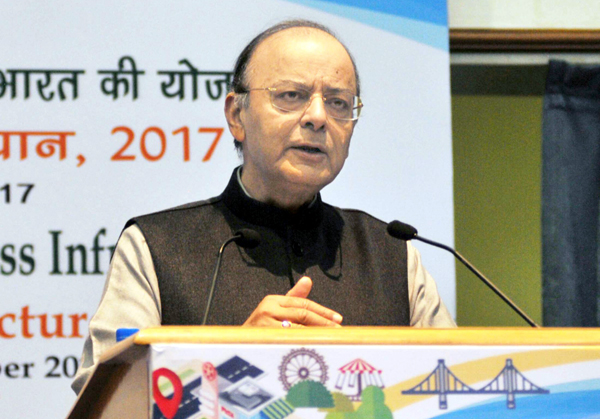NEW DELHI, Nov 30: Finance Minister Arun Jaitley today said improved macroeconomic fundamentals has placed India on the growth trajectory of 7-8 per cent and the country would have to invest heavily in infrastructure over the next two decades to graduate into a middle income economy.
“India today, in the last three years, was for the first time in history, has been the fastest growing major economy and we do hope that in the first instance we evolve into a middle income economy and subsequently we graduate into a developed economy. That’s the economic roadmap that we have for us,” he said.
“If we have to aspire to reach this, India will need to upgrade infrastructure over the next two decades. We need a lot of investment and we will need a lot of spending,” he said while delivering 5th Annual Defence Estates Day lecture here.
Observing that inadequate infrastructure is a major hindrance in the growth, he said, the Government has been increasingly raising allocation for development of the sector.
The funding requirement for infrastructure in the country is huge and there is a requirement of a whopping Rs 50 lakh crore investment in the sector over the next five years, he said.
India has spent Rs 60 lakh crore in infrastructure during 2007-17.
In recent times, the government has increased infrastructure spending, Jaitley said, adding the Budget 2017 -18 made allocation of Rs 3.96 lakh crore for the sector.
Noting that the investment in infrastructure is essential to growth and it improves productive capacity of a nation, he said, it leads to more jobs and more economic well being.
“India has standardised itself ordinarily for a growth rate between 7-8 per cent. If it slows down, it is more towards 7 and if it paces up it is more towards 8 per cent growth. It’s already close to USD 2.5 trillion economy in terms of GDP,” he said.
During the first quarter of the current fiscal, economy witnessed a growth rate of 5.7 per cent, the lowest in the three years.
Observing that the country has moved away from old era of double digit inflation, he said, “our statutorily fixed target is 4 per cent. We have been able to keep our current account deficit under control, and over the last few years India has had exemplary performance in terms of being able to bring down its fiscal deficit,” he said.
The net effect of all these is that India is getting closer to a situation where the country can spend what it earns, and borrows relatively less, he said.
“One of the great challenges which remained in India and that directly impinges on the creation of the world class infrastructure is that India was largely a tax non-complaint society,” he said.
The adverse impact of tax non-compliant society can be felt in many areas.
“One of the efforts the government is making is slowly nudging the system into becoming compliant (rpt) compliant, he said, adding the ability to raise resources to spend on critical areas of security, infrastructure development and poverty alleviation improves,” he said.
“One factor which has to be kept in mind as far as infrastructure sector is concerned, infrastructure is created when users pay. We cannot expect infrastructure to be created out of thin air … Users have to pay for it,” he said.
Citing some of the examples, he said, airport is a success story as airport user charge is in-built in the air ticket and in-built is amount earmarked for development national highways and rural road while buying fuel.
Talking about the thrust of Narendra Modi-led government for infrastructure creation, the finance minister said as many as 250 national highway projects are underway.
“We are in the process of awarding 10,000 km national highway each year and this has now resulted in accumulative programme what is known as Bharatmala…The total investment which is going to go for the Bhartmala project is Rs 5.35 lakh crore over the next few years,” he said.
With regard to air connectivity, Jaitley said the Government is in the process of developing 35-50 more airports to improve regional connectivity under Udan. The one-hour flight would cost Rs 2,500 to a passenger.
He further said the government is also in the process of modernising 450 railway stations with the help of private sector besides improvement of port facility and inland waterways.
The Finance Minister said efforts have been taken not only to improve infrastructure in urban areas but also rural infrastructure through rural electrification drive and Pradhan Mantri Gram Sadak Yojana. (PTI)
Trending Now
E-Paper


